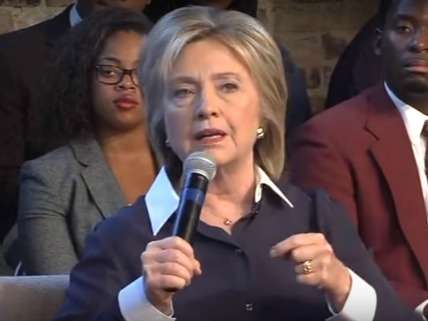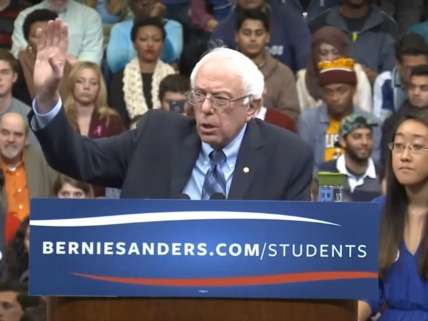Where Hillary Clinton's Marijuana Proposal Falls Short
Moving pot to Schedule II is weak tea compared to Bernie Sanders' support for repealing federal prohibition.

During an appearance in South Carolina on Saturday, Hillary Clinton said marijuana should be moved from Schedule I of the Controlled Substances Act (CSA), the most restrictive category, to Schedule II, which is for drugs that have recognized medical applications but also "a high potential for abuse." Other Schedule II drugs include cocaine, methamphetamine, and oxycodone. Here is how the presumptive Democratic presidential nominee explained her position:
What I do want is for us to support research into medical marijuana because a lot more states have passed medical marijuana than have legalized marijuana, so we've got two different experiences or even experiments going on right now. And the problem with medical marijuana is there's a lot of anecdotal evidence about how well it works for certain conditions, but we haven't done any research. Why? Because it's considered what's called a Schedule I drug, and you can't even do research on it.
Although it's not true that marijuana's placement in Schedule I makes research impossible, it is true that the drug's current classification makes research more difficult because it imposes additional regulatory burdens on investigators and their employers. Marijuana's legal status may also deter image-conscious institutions from supporting studies of the plant's medical applications. Moving marijuana to Schedule II is one provision of the Compassionate Access, Research Expansion, and Respect States (CARERS) Act, which was introduced in March by Sens. Rand Paul (R-Ky.), Cory Booker (D-N.J.), and Kirsten Gillibrand (D-N.Y.). The change also could be made administratively without new legislation, and it's not clear which approach Clinton has in mind.

Clinton's reclassification proposal is weak tea compared to her rival Bernie Sanders' bill removing marijuana from the CSA's schedules entirely, which would let states decide how to treat the drug without federal interference. Clinton does not support legalization, although she agrees the decision should be left to the states (which is the position taken by most of the Republican presidential candidates). Her rescheduling plan also falls short in failing to address another important barrier to medical studies: the federal monopoly on production of marijuana for research, which is done exclusively at the University of Mississippi under contract with the National Institute on Drug Abuse. The CARERS Act would require the Drug Enforcement Administration to license additional suppliers, as it does with other Schedule I substances.
The Huffington Post reports that moving marijuana down one schedule would amount to "reclassifying marijuana as a less dangerous drug" with "less abuse potential." That is not quite right. Although the drugs in Schedules III through V are supposed to have progressively less abuse potential, Schedule I and II substances officially have the same abuse potential. The main difference is that Schedule I drugs have "no currently accepted medical use" and therefore "a lack of accepted safety for use…under medical supervision."
You could read the latter criterion as implying that Schedule I drugs are more dangerous than Schedule II drugs—meaning that marijuana is more dangerous than, say, morphine or methamphetamine. But if a drug is not accepted as a medicine, it's hard to see how it could legally be used "under medical supervision," safely or not. Furthermore, putting marijuana in Schedule II, although it would make research somewhat easier and send a signal about how the federal government views the drug, would not automatically make marijuana legally available as a medicine, since any cannabis preparation still would have to be approved by the Food and Drug Administration.
Sanders, who is the first major-party presidential candidate to endorse marijuana legalization at the state level and descheduling at the federal level, notes that Clinton's proposal does nothing to address the 700,000 or so marijuana busts that American cops make every year. "I am glad to see Secretary Clinton is beginning to address an issue that my legislation addressed," he said in a statement on Saturday, "but her approach ignored the major issue. Secretary Clinton would classify marijuana in the same category as cocaine and continue to make marijuana a federally regulated substance. If we are serious about criminal justice reform and preventing many thousands of lives from being impacted because of criminal convictions for marijuana possession, we must remove marijuana from the federal Controlled Substances Act and allow states the right to go forward, if they choose, to legalize marijuana without federal legal impediments."
[This post has been corrected to eliminate my stupid implication that Clinton, who left the Senate in 2009, could have cosponsored a bill introduced this year.]


Show Comments (42)